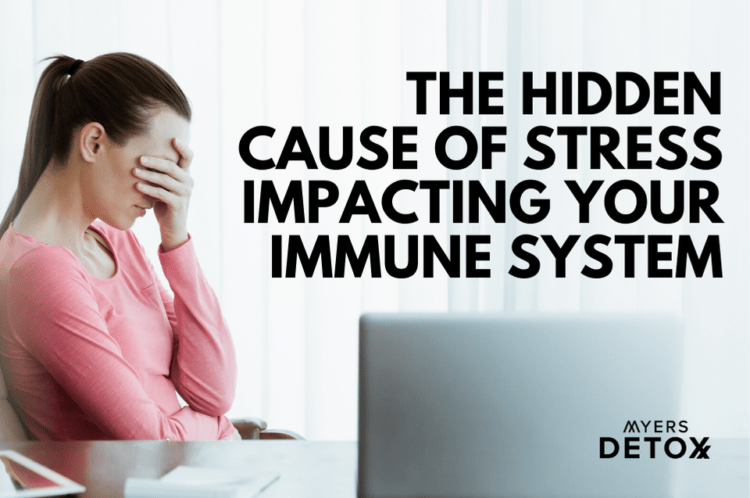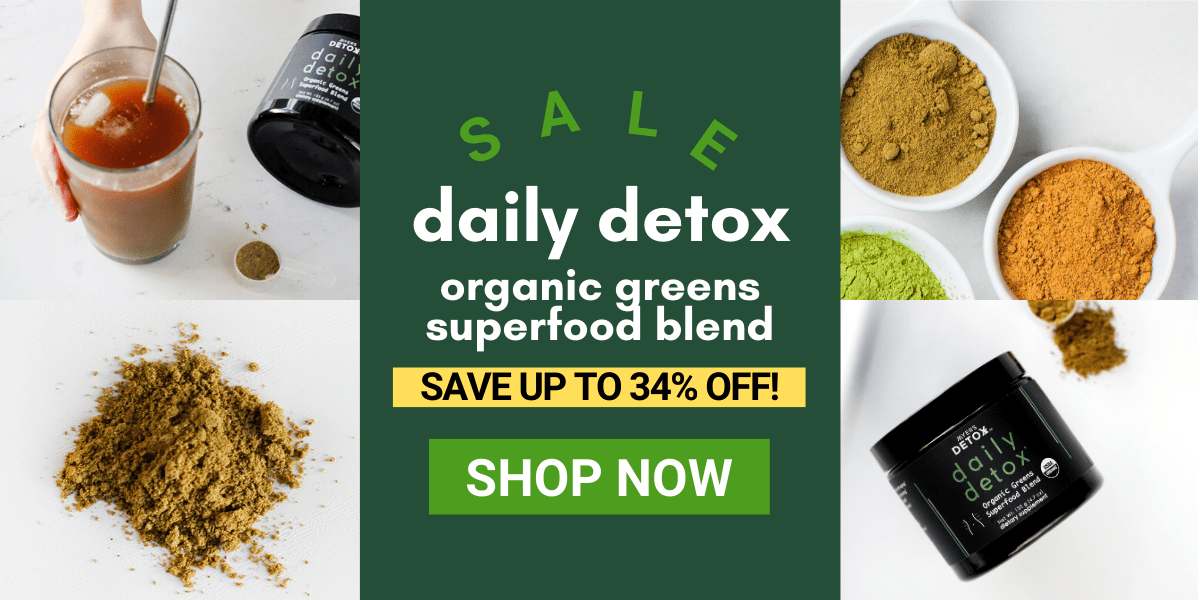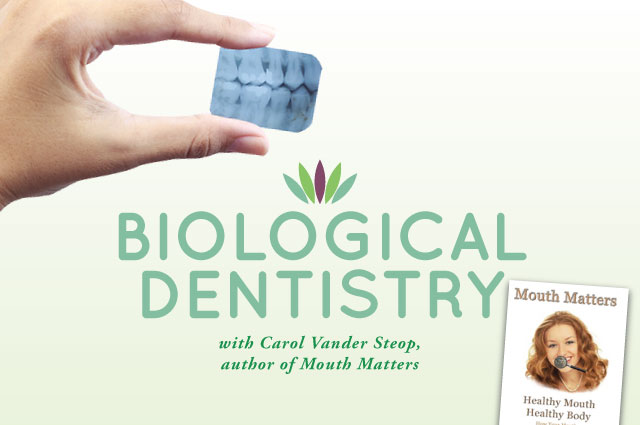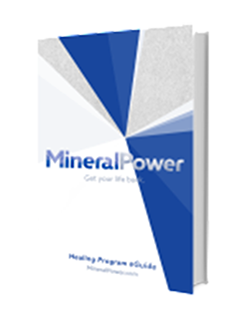The Hidden Cause of Stress Impacting Your Immune System

Right now more than ever, people are feeling on edge, stressed, and unsettled. It’s difficult to stand by as there are so many unknowns happening in the world that directly affect your life and your future.
Many people have lost their jobs, are concerned about the health of loved ones, or are generally just more anxious and unsettled from being locked up at home for weeks on end.
This is not an easy time for anyone, and while we can find solace in the fact that we are all in this together, there is still an underlying tension that can’t be denied.
Whether you realize it or not, your stress level has a direct impact on the health of your immune system. So what are you supposed to do? How do you manage the stress of what’s happening without allowing it to take over and impact your immune health?
You’re in the right place. Stress is stress, and there isn’t much you can do about what’s happening in the world around you. However, the way you handle stress is key to how it impacts you on an emotional and psychological level.
In this article, you’ll learn:
- What happens in a stress response
- The connection between stress and immunity
- The exact mechanism by which stress dramatically lower immunity
- How to manage stress to support immunity
What Happens In A Stress Response?
We all feel the impacts of stress from day to day. Whether it be the chronic stress that comes with a job that you don’t like, or the acute stress of a looming deadline, for most people, stress is a way of life.
But in truth, stress isn’t all bad. In fact, the stress response is an adaptive mechanism that’s been programmed into your DNA for thousands of years. Back when we were hunter-gatherers, an acute stress response could save your life if a predator was near. The problem with stress in modern times is that we don’t know how to shut it off.
Here’s what happens in your body under a stress response:
The response begins the moment you sense some type of danger. This could be danger like an oncoming car, watching the news, or an argument with your spouse, or even a meeting that you’re dreading. At this point, your brain jumps into action, and an area of your brain called the amygdala sends a message to another area of your brain called the hypothalamus.
The hypothalamus is the command center of your brain, and via the central nervous system, it sends signals to the rest of your body that it’s time to “fight or flee.” Stress hormones like cortisol, epinephrine, and adrenaline are signaled, and your body responds by increasing your heartbeat, blood pressure, breathing, and dilating your blood vessels so more oxygen can move around — because you’re about to see some action…
…or at least that’s what your brain thinks.
In reality, however, you’re no longer hunting for game and climbing trees to save your life. Instead, you’re sitting in traffic, studying for an exam, or trying to figure out your finances. While these stressors are much less life-threatening, they don’t seem to pass as quickly as a predator in the wild, hence the chronic stress response.
How Stress Impacts Immunity
Aside from the general discomfort that your stress response can bring, it also has a profound impact on the systems of your body, especially your immune system. In fact, there’s a whole field of medicine called “psychoneuroimmunology,” that studies how the stress response can dampen your immunity.
But this information is certainly not new. Ancient systems of medicine like Traditional Chinese Medicine (TCM) and Ayurveda have always recognized the intricate mind-body connection, with stress being a primary cause of root-level imbalance and disease in the body.
So how does emotional stress affect your immunity?
During stress, as mentioned above, your body shifts into a “fight or flee” mode. This comes with a cascade of hormonal and cellular changes that impact not only your nervous system but the cells of your immune system as well.
Research shows that in a stress response, your immune system takes a huge hit. Some examples include[1][2]:
- Diminished levels of natural killer cells (NK cells).
- Inhibition and/or overactivation of immune-enhancing cytokines (chemical messengers that are responsible for communication between immune cells).
- Lowered activity of T-cells, essential for fighting infections and destroying foreign compounds.
- Increased systemic inflammation
Taken together, it’s no wonder that chronic stress is known to put people at risk for chronic disease. Some examples of physical conditions that can stem from psychological stress include[1][3][4][5]:
- Heart disease
- Neurodegenerative disease
- Diabetes
- Cancer
- Autoimmune disease
- Common cold
- Irritable bowel syndrome
Some research suggests that the profound impact of stress on immunity stems from the dysregulated inflammatory response that comes with high levels of stress hormones[6].
Regardless of the mechanism, however, what’s clear is that psychological stress is a potent inhibitor of immunity. Therefore, if you want to keep your immune system strong, it’s crucial that you find ways to manage your stress response.
Could a Sluggish Liver Be Behind the Stress Taxing Your Immunity?
Although not always thought of as an immune organ, your liver plays a central role in eliminating pathogens from your circulation[25]. However, the role of liver in immunity may be much more broad than simply assisting in the clearance of unwanted compounds. In fact, through your stress response, your liver health could potentially make a significant impact on the strength of your immune response.
Modern medicine recognizes the association between psychological stress and the progression of liver disease. In fact, many disease states are seen as a cause of stress in your body. Of course, having a serious health condition would create some level of emotional stress[21].
However, ancient systems of medicine like TCM (Traditional Chinese Medicine) have long understood that liver dysfunction can actually be the source of emotional issues. In TCM, the liver is responsible for a healthy flow of emotions, when the liver is stagnated (known as liver qi stagnation), emotions can get stuck, and excess stress and negative emotions may prevail[22].
For the Western mind, looking at the mind-body connection in this way may feel a little backward. However, modern research is showing us that TCM may have had it right all along.
In one study, researchers examined the stress response on the incidence of liver disease and found that it was a chicken-egg situation. While stress certainly seems to have an impact on liver health, diseases of the liver may also instigate emotional imbalances like depression and anxiety[23].
From a physiological perspective, your liver is responsible for breaking down and removing stress hormones from your body. Therefore, if your liver is stagnated or sluggish, even a small stressor could magnify as your stress hormones continue to circulate without being excreted.
Remember that these hormones produce the cascade of events that leave you feeling overwhelmed and stressed. So it would make sense that a liver that isn’t properly supported may result in levels of stress that are unprecedented[24].
Additionally, damaged liver function can lead to decreased immune surveillance (a process by which immune cells keep a watch out for harmful compounds), and increased levels of pro-inflammatory compounds (which can then lead to systemic inflammation).
Caring for your liver on a daily basis by supporting it with the nourishment it needs to function is an excellent way to support the elimination of excess stress hormones. This organ is the gatekeeper to your systemic circulation and is responsible for clearing out anything that doesn’t belong.
Supplements like Daily Detox offer a gentle solution to your everyday detox needs.
5 Ways To Manage Stress And Support Immunity
Aside from supporting your liver, there are several other research-backed ways that you can manage your stress to support a healthy immune system. These include:
Meditation
Perhaps one of the oldest forms of relaxation, meditation provides you with a gentle way to quiet your mind and become present. Mindfulness meditation, in particular, is a practice of being in the moment and non-judgmentally allowing thoughts and feelings to come and go.
Research shows that meditation can positively affect your emotional and physical wellbeing in a number of ways by reducing symptoms of anxiety and depression, relieving insomnia, and reducing blood pressure, to name a few[7].
In a study targeting anxiety, researchers found that after a single session of mindfulness meditation, the participants experienced a reduction in stress[8].
Deep Breathing
Your autonomic nervous system has two branches — the sympathetic nervous system and the parasympathetic nervous system. During a stress response, your sympathetic nervous system turns on, and you go into fight or flee mode.
While this certainly serves a purpose, for your body to rest and repair, you need to be in parasympathetic mode. In parasympathetic mode, your heartbeat slows, your breathing becomes deeper, and your blood pressure goes back to a normal level.
Unfortunately, many of us spend our days running around from one meeting or errand to another in a frenzy of sympathetic mode energy.
So how can you break the cycle of sympathetic dominance? One of the quickest and easiest ways is through deep breathing.
Since both your respiration and your heart rate can be affected by the rhythm of your breath, when you breathe deeply, it sends a signal to your brain that you are safe, and there is no threat near. This allows your nervous system to calm, and parasympathetic mode to take over[9][10].
Adaptogens
Adaptogens are one of the most incredible plant medicines out there. They work in your body to reduce the mental and physical effects of stress on your body and help you “adapt” to whatever is happening.
Adaptogenic herbs can assist your body in managing stress by reducing levels of the stress hormone cortisol and modulating the way your body responds to stress. Some of the benefits associated with adaptogens include[11]:
- Neuroprotection
- Anti-depressive
- Anti-fatigue
- Anxiolytic
- Cognitive support
- Central nervous system stimulation
One of my favorite adaptogenic herbs is schizandra, which is why I incorporated it into my Daily Detox powder. Research shows that schizandra can reduce the activity of stress hormones and lower blood glucose, while also protecting one of your vital glands responsible for a healthy stress response — your adrenals[12][13].
In addition, schizandra plays an immunoregulatory role in your body (helping to regulate your immune system). That makes this fantastic herb a two for one, with both stress and immune support[14].
Another adaptogenic herb that’s been very well studied is ashwagandha. Ashwagandha is often used to relieve stress and anxiety and is known to have a particularly calming effect on your HPA axis (hypothalamic, pituitary, adrenal), which is one of the most prominent pathways responsible for your stress response[15].
Exercise
While everyone knows that physical exercise is essential for overall health and wellbeing, many people don’t realize the crucial role it plays in stress management. One of the commonly proposed mechanisms for exercise’s role in reducing stress is its effect on your neurotransmitters.
Specifically, when you exercise levels of dopamine, serotonin, and noradrenaline are all modulated. These neurotransmitters, also known as your “happy hormones,” make you feel relaxed and at ease, and generally lift your mood[16].
Some research even suggests that exercise could be a crucial aspect of treating depression and other neuropsychological conditions[17].
Essential Oils
Another incredibly simple way to calm your nervous system is through the use of aromatherapy. Aromatherapy uses essential oils extracted from plants to target specific tissues and systems in your body to treat a variety of conditions.
When it comes to stress, one oil that’s been studied more than any other is lavender. Research shows that lavender essential oil can calm anxiety, stabilize mood, act as a sedative, has neuroprotective activity, and may even relieve pain[18][19][20].
Other essential oils known for their calming and stress-reducing effects include:
- Frankincense – May support healthy cellular, immune, and nervous system functions. It’s believed that the oil transmits messages to the limbic system of the brain, which is known to influence the nervous system. It may also increase white blood cell activity and reduce inflammation.
- Valor – Provokes thoughts of courage to keep moving, to work through things, get you out of that stuck pattern of ruminating thoughts, which can lead to stress and anxiety.
- Lavender – Promotes feelings of calm and supports a restful night’s sleep. It may also help relieve nervous tension and anxiety.
- Stress away – Promotes wellness and may promote feelings of calm. A component of this oil may help the body respond better to irritation of the skin. This is my go-to solution to combat stress that creeps into everyday life.
- Peace and Calming – A calming, sweet aroma, this blend is one you’ll love using at bedtime. Also great to help create a peaceful environment for meditation.
- Lemon – May support digestion and healthy respiratory function. Promotes air purification.
- Citrus Fresh – Citrus fresh is a combination of all happy anti-depressant citrus oils like orange, lemon, and tangerine.
- Peppermint – The health benefits of peppermint oil include its ability to help to inspire alertness, as well as aid indigestion, respiratory problems, headache, nausea, fever, stomach and bowel spasms, as well as for pain relief.
This is the kit I recommend to get started with all these essential oils, save 50%, and get some incredible bonuses!
Stress Is a Mind-Body Issue
Although psychological stress can feel like it all stems from the emotional and mental side of things, it’s undeniable that stress impacts the mind-body system as a whole. Therefore, if you want to manage stress, you need to find ways to not only calm and balance your mind, but also ways to support your physical health and wellbeing.
To support your mind, try practices like deep breathing, meditation, and using essential oils. To support your body, exercise is key along with targeted nutrients that support adrenal health as well as liver function.
If you don’t already have a liver detox practice, I highly recommend picking up a supplement like Daily Detox. Daily Detox is a combination of herbs and superfoods that not only promote liver health, but also provide adaptogenic herbs to support your stress response as well.
Takeaway
Your stress response and immune system are intimately tied together. The good news is, the orchestration of hormones and chemical messengers that keep these systems running smoothly are meant to keep your body in tip-top shape. The bad news is, in modern society, our stress response is often overstimulated, resulting in an overworked immune system.
What’s more, your liver plays a crucial role in maintaining the health of both your stress and immune systems. When your liver is overworked (which it often is), it can’t eliminate excess stress hormones as efficiently as it needs to.
Therefore, to care for immunity means to care for your stress response and liver. Finding practices that can help keep you calm and grounded is central to immunity. Likewise, nourishing your liver with nutrients that optimize its function on a daily basis is key. Remember to take care of both your mind and your body, and you’ll be well on your way to a healthy immune system and a more balanced stress response.
Click Here for References+
- Mariotti, Agnese. “The effects of chronic stress on health: new insights into the molecular mechanisms of brain–body communication.” Future science OA 1.3 (2015).
- https://www.apa.org/research/action/immune
- Liu, Yun-Zi, Yun-Xia Wang, and Chun-Lei Jiang. “Inflammation: the common pathway of stress-related diseases.” Frontiers in human neuroscience 11 (2017): 316.
- Takkouche, Bahi, Carlos Regueira, and Juan Jesús Gestal-Otero. “A cohort study of stress and the common cold.” Epidemiology 12.3 (2001): 345-349.
- Qin, Hong-Yan, et al. “Impact of psychological stress on irritable bowel syndrome.” World journal of gastroenterology: WJG 20.39 (2014): 14126.
- https://www.sciencedaily.com/releases/2012/04/120402162546.htm
- https://www.nccih.nih.gov/health/meditation-in-depth
- https://www.sciencedaily.com/releases/2018/04/180423135048.htm
- Jerath, Ravinder, et al. “Physiology of long pranayamic breathing: neural respiratory elements may provide a mechanism that explains how slow deep breathing shifts the autonomic nervous system.” Medical hypotheses 67.3 (2006): 566-571.
- Russo, Marc A., Danielle M. Santarelli, and Dean O’Rourke. “The physiological effects of slow breathing in the healthy human.” Breathe 13.4 (2017): 298-309.
- Panossian, Alexander, and Georg Wikman. “Effects of adaptogens on the central nervous system and the molecular mechanisms associated with their stress—protective activity.” Pharmaceuticals 3.1 (2010): 188-224.
- Li, Jie, et al. “Effect of Schisandra chinensis on interleukins, glucose metabolism, and pituitary-adrenal and gonadal axis in rats under strenuous swimming exercise.” Chinese journal of integrative medicine 21.1 (2015): 43-48.
- Lee, Seungjoo, et al. “Schizandra chinensis and Scutellaria baicalensis counter stress behaviors in mice.” Phytotherapy Research: An International Journal Devoted to Pharmacological and Toxicological Evaluation of Natural Product Derivatives 21.12 (2007): 1187-1192.
- Lin, Rong-Dih, et al. “The immuno-regulatory effects of Schisandra chinensis and its constituents on human monocytic leukemia cells.” Molecules 16.6 (2011): 4836-4849.
- Lopresti, Adrian L., et al. “An investigation into the stress-relieving and pharmacological actions of an ashwagandha (Withania somnifera) extract: A randomized, double-blind, placebo-controlled study.” Medicine 98.37 (2019).
- Lin, Tzu-Wei, and Yu-Min Kuo. “Exercise benefits brain function: the monoamine connection.” Brain sciences 3.1 (2013): 39-53.
- https://www.sciencedaily.com/releases/2016/02/160225101241.htm
- Ali, Babar, et al. “Essential oils used in aromatherapy: A systemic review.” Asian Pacific Journal of Tropical Biomedicine 5.8 (2015): 601-611.
- Koulivand, Peir Hossein, Maryam Khaleghi Ghadiri, and Ali Gorji. “Lavender and the nervous system.” Evidence-Based Complementary and Alternative Medicine 2013 (2013).
- Malcolm, Benjamin J., and Kimberly Tallian. “Essential oil of lavender in anxiety disorders: Ready for prime time?.” Mental Health Clinician 7.4 (2017): 147-155.
- Vere, Cristin Constantin, et al. “Psychosocial stress and liver disease status.” World journal of gastroenterology: WJG 15.24 (2009): 2980.
- Scheid, Volker. “Depression, constraint, and the liver:(dis) assembling the treatment of emotion-related disorders in Chinese medicine.” Culture, Medicine, and Psychiatry 37.1 (2013): 30-58.
- Bonkovsky, Herbert L. “On stress and the liver: a chicken and egg conundrum.” Gastroenterology 148.5 (2015): 894-897.
- Martel, Fátima. “Catecholamine uptake and metabolism in the liver.” Advances in Pharmacology. Vol. 42. Academic Press, 1997. 350-352.
- van Lookeren Campagne, Menno, and Admar Verschoor. “Pathogen clearance and immune adherence “revisited”: immuno-regulatory roles f










